Social activist Julia Ward wrote “The Battle Hymn of the Republic” in 1861, the same year that Henry Timrod composed his “Ethnogenesis” (the poem which kicked off part 2 of this series). In it, she penned that God will use His “terrible swift sword” to bring judgment upon “condemners” and “crush the serpent with his heel.” The wicked this New Yorker wanted to vanquish was, of course, the Southern people.
Howe, the daughter of a Wall Street Banker and Calvinist-turned-Unitarian, saw the Northern cause as a holy war – the Yankees’ manifest destiny – and the Union as the army of God, whose cannons rained hellfire upon a peaceful people. Or God’s “fiery gospel writ in rows of burnished steel,” as Howe liked to call these weapons of conquest. “Glory! Glory! Hallelujah!” so goes the refrain.
Howe typifies the New England crusader mindset – a self-aggrandizing moral superiority that historian Clyde Wilson terms the Treasury of Counterfeit Virtue: “a kind of plenary indulgence that automatically pre-justifies the motives of American violence and the goodness inherent in America’s acts to force the world into conformity with its ideal version of itself.” You know, progress.
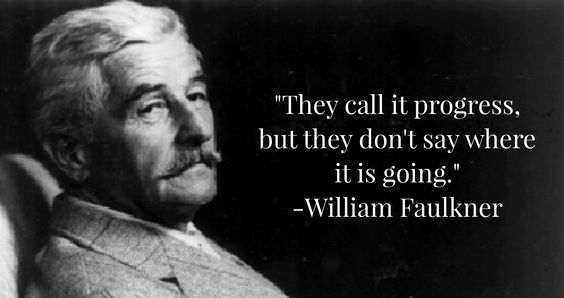
She also represents the consequence of what cultural historian Richard Webster called “secular monasticism,” in which “every Puritan could become his own abbot, regulate his own day, weigh his own sins inside the dark cell of his own conscience and there prescribe and inflict the penance which he deemed just.” Puritans were the predestined elect, so why not?
It was this “rational soul” of the Puritans and their secular descendants that was the absolute sovereign, not the Lord. It required a “spiritual police force no less cruel than Calvin’s at Geneva,” where (under his theocratic rule in the 1540s) 150 dissidents were burned alive on slow-burning pyres of green wood in an effort to promulgate adherence to the theologian’s cleansed religion by civil means.
It was precisely Puritanism’s rigid totalitarianism, rational asceticism, and adherence to a fluid theology (as described in part 1) that made it a breeding ground for the progressive ethos. Eventually gone were the Jesus followers, but what remained were rootless, majoritarian radicals, who aimed to “fortify the government of their own reason.”
Their vehement opposition to Scriptural traditions and Church heritage, and emphasis on personal interpretation made Puritanism intrinsically schism-prone. With each re-creation came gaping theological holes to be filled with differing ideologies, until God and Biblical justice were altogether abandoned for “social justice.”
Even when Calvinist-borne Congregationalism became the official state religion of Massachusetts, it still couldn’t stop the constant splintering and “the spreading of the contagion of corrupt opinions,” as colonist Rev. Thomas Shepard described it. After all, change had always been at the heart of the Puritan ethic.
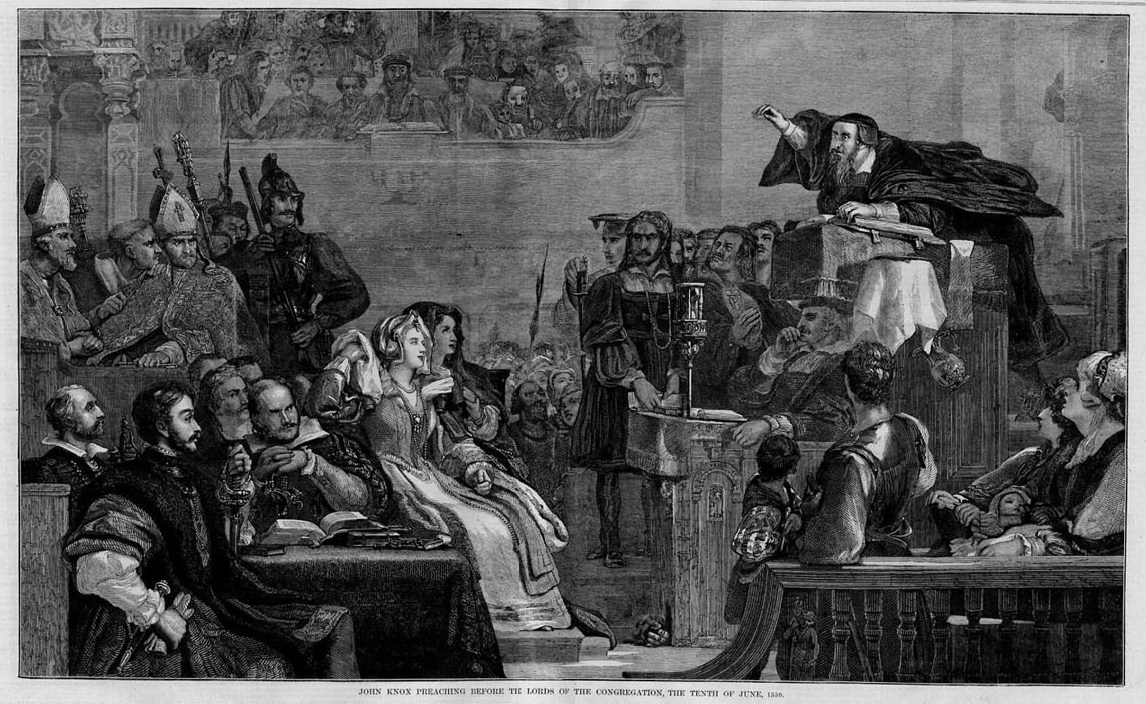
Yet, the core dogma of forging heaven on earth, a new Zion, held fast. It was simply passed from the hands of the Christian Hebraist fathers to their puritanical atheist sons. No longer necessary were parishes or pastors or even God. Statism became the new church and the zealotry of its members was/is stronger than ever.
People would eventually become trained in the habits of obedience to the religion of secular Puritanism, if beaten down enough through law, regulation, invasion, war, re-education, propaganda, and reconstruction. Why recognize the reality of original sin and live your life in humble accordance when there is forced sanctification of the here and now?
That’s the faith of the progressive Puritan. Presentist. Moralistic. Hubristic. Perfectible. Activist. Ideological. Reform-minded. Reinventing and forward thinking. “His truth is marching on.”
So, how else did this puritanical polity begin to unfold? Let’s pick up where my last two blogs left off.
The Enlightenment
By the 18th century, the Enlightenment was taking root on both sides of the Atlantic with its core belief that human reason was sufficient for all earthly good. From that sprang the theoretical idea of “equality.”
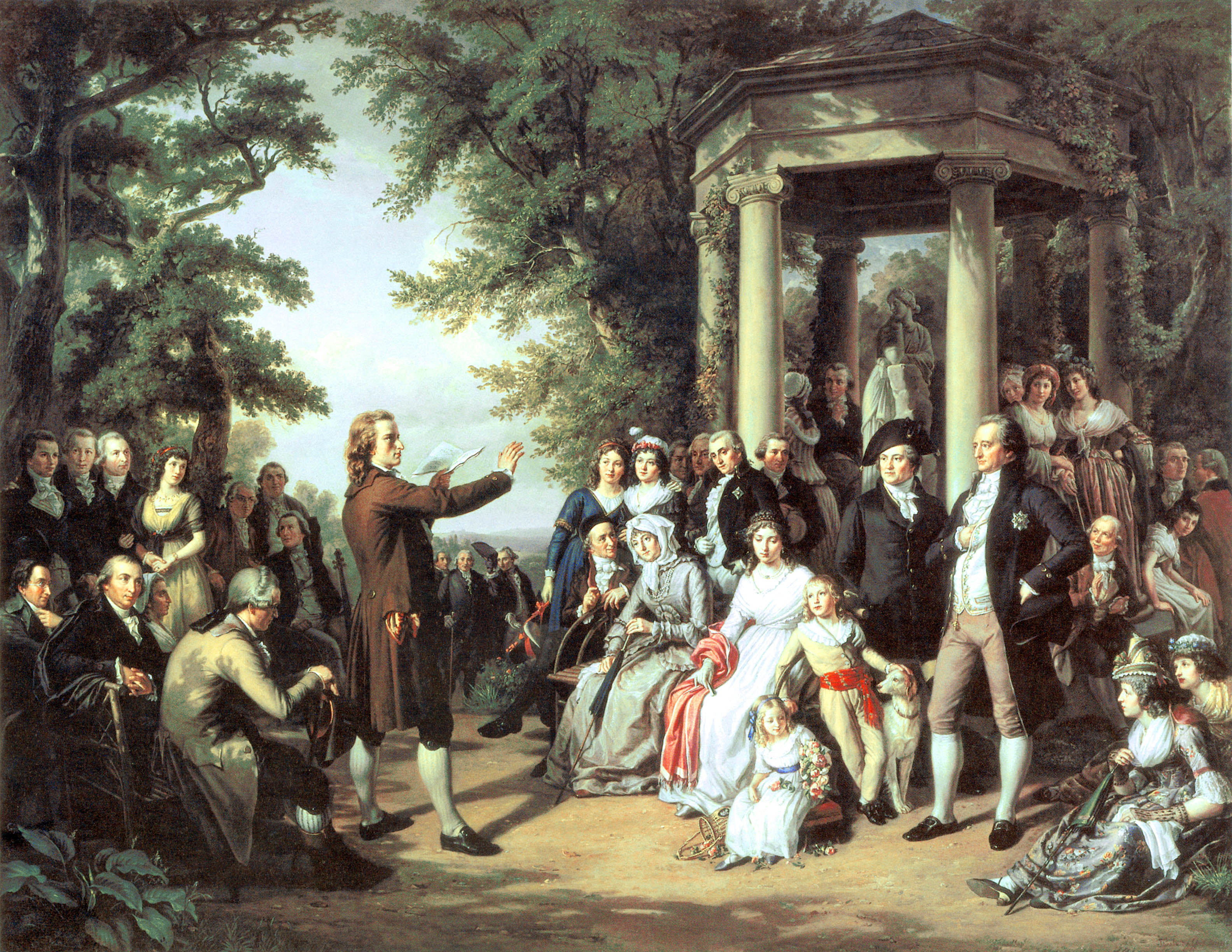
And not the Golden-Rule kind of concept of understanding that all men are made in the image of God and, thus, have dignity and worth, no matter his station in life or his unique differences. But rather the subversive kind of equality that wants to eradicate true human diversity. In other words, egalitarianism.
This social philosophy presupposes that people aren’t distinct, none having his own talents and desires. What is paramount is the common, the greater good, no matter the cost.
Although some positives were born out of the Enlightenment, it also fostered vapid humanism over beautiful individualism. Ego over faith. Present over past. Man over God. Worldly over eternal. Voltaire over Jesus.
And depending on where and when it took hold, it could result in liberty (the American Revolution with Jeffersonianism) or mob rule (the French Revolution with Robespierre and the Reign of Terror … and, of course, modern-day America with cultural Marxism).
The Age of Enlightenment also doubled-down on the Puritan notion of newness. As Thomas Paine’s influential pamphlet “Common Sense” stated, “We have it in our power to begin the world again.”
The Great Awakenings
From the 1730s-1750s, the First Great Awakening took place both in the colonies and in England. The revivalists, such as Puritan preacher Jonathan Edwards, countered the religion-is-dead notions of the Enlightenment and tried to unite pastors from different Protestant denominations.
The traveling missionaries spread the Gospel through dramatic sermons at large outdoor gatherings. The revivals were often received by hyper-emotional attendees and resulted in mass conversions.
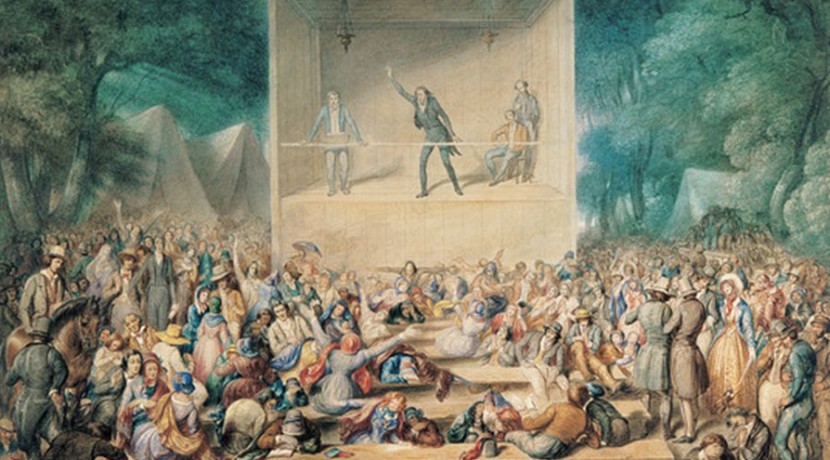
The Second Great Awakening spanned the 1790s-1840s in the newly formed United States. This reprise gave rise to Christian social activism, most specifically the abolition, temperance, suffrage, and public-education movements, and also pinpointed evangelizing efforts to settlers moving West.
Though religious fervor abated, these Awakenings and their fire-and-brimstone preachers like Charles Finney had a lasting impact on America through not only their establishment of colleges and seminaries, but also their emphasis on democratization and social reform. The progressive hive-mind was spreading both theologically and politically.
Differences & independence
As spelled out earlier in the series, the vast differences between North and South had existed from the very beginning. Cultural, religious, economic, and political.
Southerners were in large part conservative, upholding social patterns of culture and heritage, not knocking them down. Distrustful of democracy, they were agrarian, poor farmers, landed gentry, rural folk, indentured servants, ladies and gentleman, entrepreneurs, soldiers, and clannish refugees.
Northerners were chiefly ideologues, repudiating tradition, not preserving it. Corporate and majoritarian, they were commercial, industrial, urban folk, mercantilists, bankers, peddlers of easy money, seafarers, and conquerors and savers of the unwashed masses.
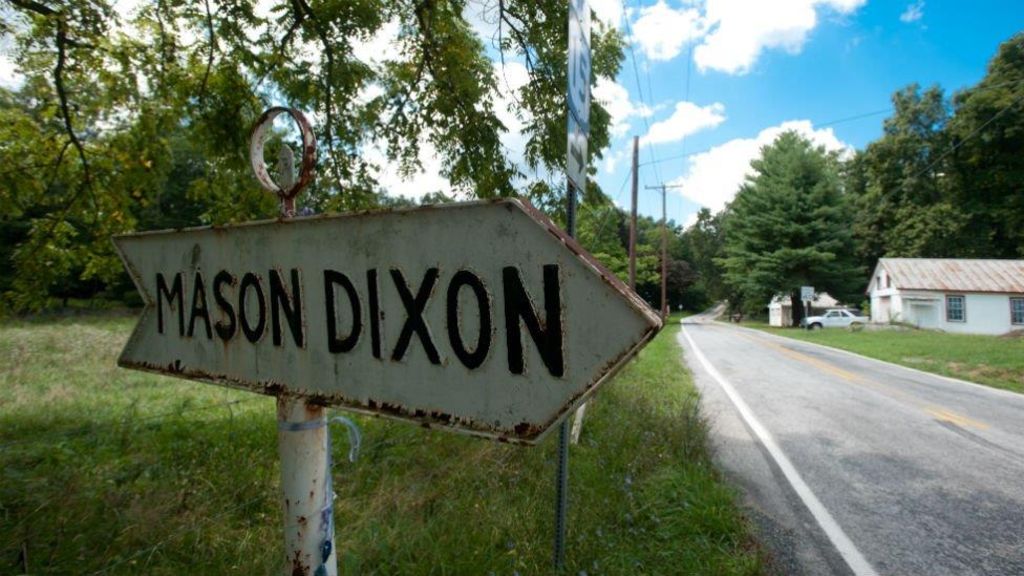
While the colonies were under British rule, these disparities really didn’t cause much of a fuss. But once the sections joined forces to secede from England, create a republic, and govern it first under the highly decentralized Articles of Confederation and then the more consolidated U.S. Constitution, hostilities grew.
During the Revolutionary War, Southerners fought not to obtain the “abstract universal rights” of equality, the general will, and progress (as did many New Englanders), but rather to resist King George’s “disrespect” toward the colonies. They wanted to defend their rights as Englishmen: Common Law, property rights, and prosperity through self-determination.
Constitutional crises
Centralization was key for New England, whereas decentralization was fundamental for Southerners. This was keenly typified by the Virginia representatives at the Constitutional debates.
“Patrick Henry questioned the authority of the Philadelphia Convention to presume to speak for ‘We, the people’ instead of ‘We, the states,'” explains historian William J. Watkins, Jr. “In [Henry’s] view, delegates should have only recommended amendments to the Articles of Confederation.”
And it was George Mason who insisted on the Constitution having enumerated powers and negative liberties. This catalyzed the creation of the “Bill of Rights,” which James Madison wrote based upon Mason’s “Declaration of Rights” for Virginia from 1776.
“Mason countered that a national, consolidated government would overburden Virginians with direct taxes in addition to state taxes, and that government of an extensive territory must necessarily destroy liberty,” Watkins adds. Thus, Mason was one of only three Constitutional delegates who refused to sign the document.
“… He wanted a clear line between the jurisdictions of the federal and state governments, including the judiciary, because he feared the shared powers would lead to ‘the destruction of one or the other.'” Prescient.
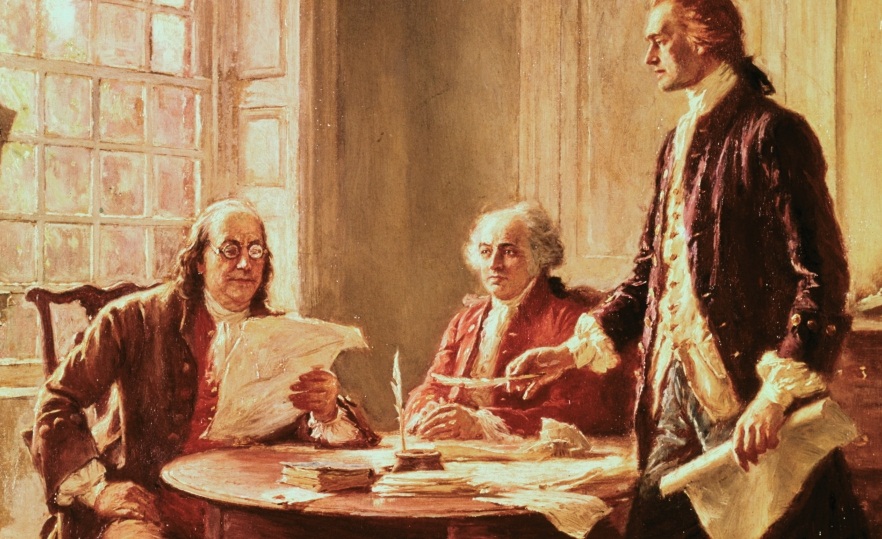
The Virginia and Kentucky Resolutions (written by James Madison and Thomas Jefferson respectively) further prove this decentralist Southern position, which today we proponents call “original intent” and opponents call the “Lost Cause.”
American “Exceptionalism”
In “The Pilgrim’s Progress,” Puritan preacher John Bunyan wrote, “The way to the Celestial City, lies just through this town, where the lusty fair is kept; and he that will go to the City, and yet not go through this town, must needs go out of the world.”
The literary classic speaks of spreading the message of Puritanism beyond the borders of Massachusetts. Granted, Christians are called to be fishers of men, sharing the Good News with humanity. But what the Puritans ended up spreading was progressivism. Change we can believe in.
“It has been our (America’s) fate not to have an ideology, but to be one.”
— Historian Richard Hofstadter
That is what America has become. She is the ideology. Always new. Always purifying. Always growing. Manifest Destiny. “We are five days away from fundamentally transforming the United States of America,” admitted Barack Obama, October 30, 2008. Progress and predestination now and then.
The artwork symbolizing this creed (pictured at the top of the blog) is called “American Progress.” Like an oil-brushed Julie Howe, the angelic female Progress is adorned with “the star of empire” on her forehead as she readies and leads us toward an era of modernity, democratic advancement, and westward expansion all the way to the Pacific.
This rallying cry was underpinned by the idea of divine providence: that God endowed America’s exceptionalism and, by virtue, her growing dominion. So by the 1820s, many Puritan inheritors had become moral crusaders in the burgeoning territories.
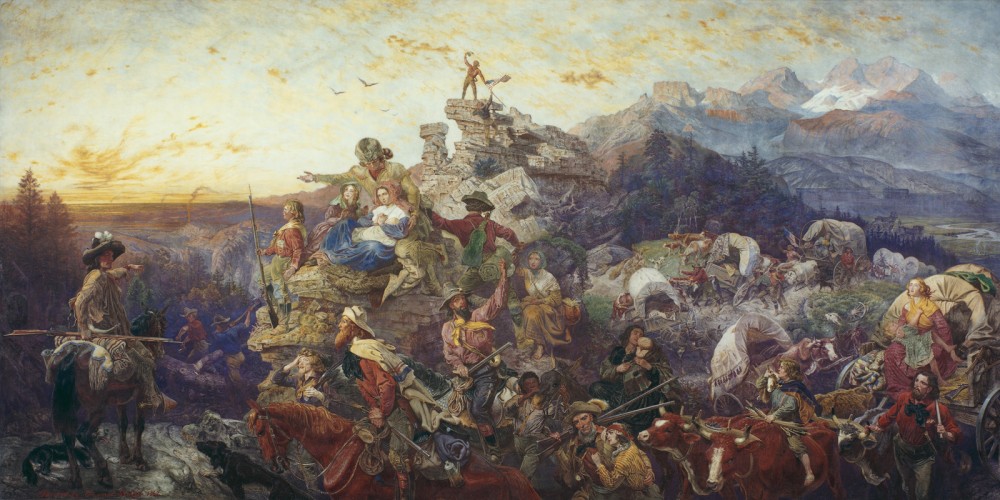
Steeped in the Puritan ethic – a works-based path to salvation that played down the tenet of original sin – these reformers sought to civilize the Indians and Catholic immigrants settling the frontier, readying themselves for their eventual taming of that uncouth creature known as Johnny Reb.
Some Southerners succumb
Interestingly, “it was Southerners who embraced the great national wars against Great Britain in 1812 and Mexico in the 1840s … (and) the concepts of national greatness and manifest destiny,” explains historian John Devanny.
In fact, it was Virginia-born James Monroe who purchased Spanish Florida. He also gave us the influential Monroe Doctrine. It was a policy that put European powers in check, isolating the U.S. from their sphere of influence. But the doctrine also enabled the U.S. to seek its own ambitions in all of the Americas sans Old World competition.
It was Thomas Jefferson who made the Louisiana Purchase from France, doing so for unencumbered trade access to the Mississippi, but still doubling the size of the U.S. It was Virginian John Tyler who pushed for and signed a bill annexing Texas, permitting its statehood.
It was North Carolina-born and Tennessee-raised James K. Polk, who secured the Oregon Territory from Britain. He also acquired California and much of the Southwest through the Mexican-American War.
And it was Virginia-born Henry Clay, known as the “Great Compromiser,” who made a name for himself as a Kentucky politician by promoting the “American System” – a high-tax, pro-national bank, pro-central authority, nationalistic philosophy. In other words, Hamiltonianism.
There were notable exceptions, like John C. Calhoun, John Randolph of Roanoke, John Taylor of Caroline, and Jefferson before and after his presidency. But still, many influential Southerners seemed to have temporarily succumbed to the progressive mentality.
But all that changed with the election of 1860. It was the tipping point that gave “Dixie a ‘national consciousness,'” as Devanny describes it, snapping the duped Southern statesman out of his malaise and rekindling in him his localist and limited-government heritage.
Please check out the fourth blog in the series, “Yankee sanctification.”
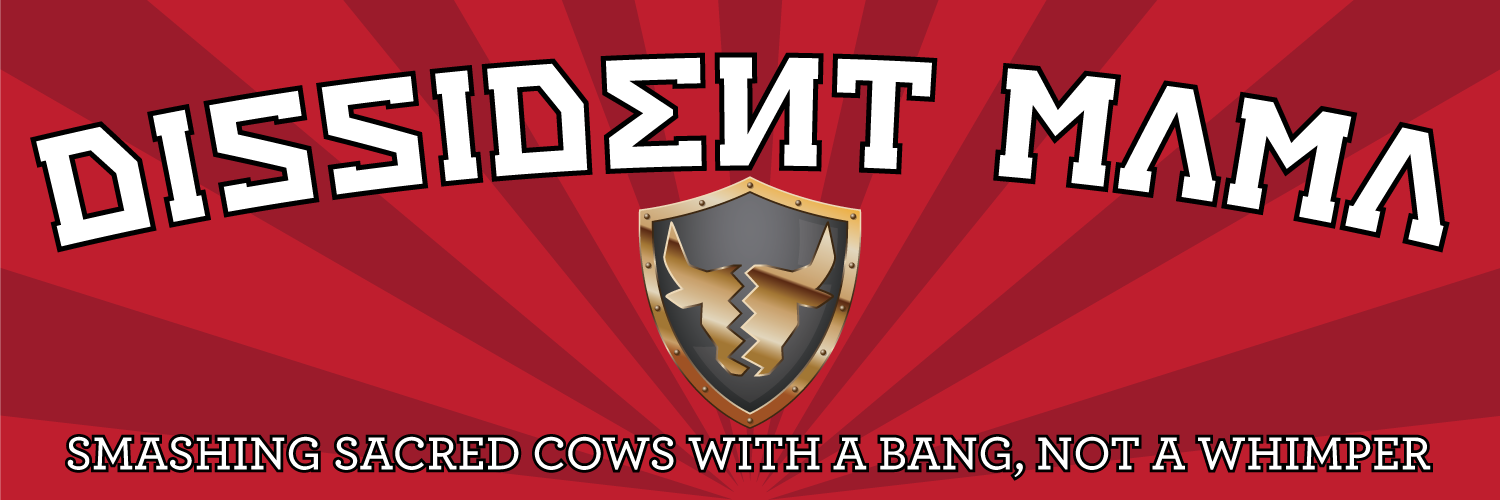
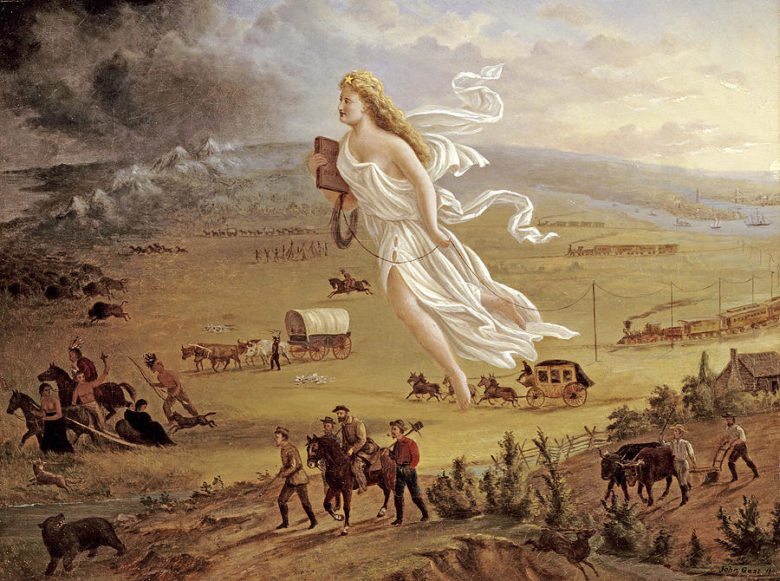



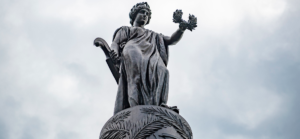
Comments
Hey Rebecca,
Well, you certainly know how to pick ‘em.
There was a clear burden of research for that piece. I would have struggled to keep it to one post. Which is to say, this is the work of a career and you did it briefly and well.
A couple of things additionally were happening as well as a very important thing that did happen, and together all that works to pretty much end Winthrop’s Puritan experiment.
Firstly, as we have discussed, it was a doomed-to-fail venture from the start. The critical error in his thinking was to ignore the heart of man. Try though he might to recreate the perfect world of and for God, the new world meant so many new ways to be tested and it is simply folly to think none would succumb. The second problem with the first is one we see as parents: our children assume a level only because they know nothing else. So too was it with the second gen Puritans. The tales and stories of struggle and mission, serious though I am sure the tellers were, fell on what had to be youthful ears. Despite the rigors of the social fabric, I struggle to ignore that youth sees a brighter future regardless when they lived.
The second thing that happened was actually a few in and around the same time. Social Darwinism and Pragmaticism, to use the word from Pierce. He and James made much of this new way of thinking.
The innovation of things, the identification of man as a part of his environment and therefore material in its creation ala Emerson makes that time period very busy and active and full of choices where previously there were few choices and a much better ability to manage the people who go astray.
My real challenge is with the word progressive. If I read you right, you suggest that the progressive of Woodrow Wilson started Julia. I simply do not know enough about Lincoln or Johnson to know if that can be.
The progressivism I think of is decidedly Woodrow’s. His is a complete rejection of most of the Declaration and makes no attempt to hide his scorn for the Founders. His progressivism is that of the elites, with proper Ivy League educations, being the leaders and for their genius alone are we to be saved for they can thing the answers for us. With the very many ways for the masses to engage their own intellects, I need more convincing that it was not the product of evil WW.
I offer that for I’ve made something of a spectacle of myself with you I fear, but not in a bad way. You have been receptive to feedback so I felt it would be welcomed again.
I remain impressed with the research and skill to reduce it to so small a post.
Good work.
Author
All good points, but you forget, I haven’t finished my series yet … 1-2 more parts to go! I can’t believe you called my efforts brief – that’s a first! 🙂 But I recently had a fellow libertarian whom I respect tell me that my blogs had convinced them that “puritanical progressivism” wasn’t hyperbole, but a real and legit thing, with history to back it up. Gimme a bit more time, Dann, and I hope to have you convinced, too!
Wonderful series! You are quite a historian!
Author
Thank you so much. I’ve learned from the best at Shotwell and Abbeville! Your kind words mean the world to me. 🙂
You read the secret six by otto scott ?
Author
No, I never have … but it seems I should. I just googled it, and it looks riveting and rather dissident. 😉 Thanks for the suggestion, Randy!
You are repeating falsehoods about John Calvin. Calvin argued to minister to Servetus, not to execute him.
Calvin opposed the execution of Servetus at the hands of civil government officials. The Pope, not Calvin, also wanted Servetus dead. Calvin’s ecclesiastical power was limited to preaching his own sermons. Calvin had to walk a fine line to maintain his church with political and military potentates continually seeking to use Calvin’s reputation to advance their own ambitions.
Following is a quote from The Great Christian Revolution by Otto Scott, R. J. Rushdoony, and Mark Rushdoony. There is too much written of this incident to post it all here;
“Calvin never ruled Geneva. The city was not a totalitarian society, but a Republic, with
elections and dissent. Calvin held no civil office, could neither arrest nor punish any citizen,
appoint or dismiss any official. To argue that his eloquence and logic constituted tyranny is to
invent a new standard.
Calvin worked as a pastor, preached twice on Sundays and once every Monday, Wednesday
and Friday. In late 1542 he was urged to preach more often (!), but this proved too much, and he
broke down. When his health improved, his burdens increased. He spoke without notes and
directly from the Hebrew Old Testament and the Latin New. And he prepared.”
p 125
***
No good man has ever had a worse press; no Christian theologian is so often scorned; so
regularly attacked. He is a devil-figure for anti-Christians and even for many imperfectly
educated Christians. This is odd, for America does not ordinarily attack religious leaders or
faiths. Even the Ayatollah Khomeini, inspirer of bloody purges, was not used as a peg to attack
Islamic beliefs. But there has long been open season on Calvin.
This is especially strange because Calvin’s doctrine is “just the Augustianism common to the
whole body of Reformers – for the Reformation was, from the spiritual point of view a great
revival of Augustianism. And this Augustianism is taught by him not as an independent
discovery of his own, but fundamentally as he learned it from Luther…in much detail from
Martin Bucer into whose practical, ethical point of view he perfectly entered. Many of the very
forms of statement most characteristic of Calvin – on such topics as Predestination, Faith, the
stages of Salvation, the Church, the Sacraments – only reproduce, though of course with that
clearness and religious depth peculiar to Calvin, the precise teachings of Bucer, who was above
all others, accordingly, to Calvin’s master in theology.
“Calvin did not originate this system of truth; as ’a man of the second generation’ he
inherited it, and his greatest significance is…that he was able, as none other was, to cast this
common doctrinal treasure of the Reformation into a well-compacted, logically unassailable and
religiously inspiring whole. In this sense it is as a systemizer that he makes the greatest demand
on our admiration and gratitude. It was he who gave the Evangelical movement a doctrine.” 206
That such a contribution, and so God-centered a thinker should arise in the terrible sixteenth
century to lift men’s eyes from a frightful landscape toward eternity, was among the greatest
events of history.
***
p 126
***
Servetus holds a special status in anti-Calvinist legends. The death of this single individual,
out of all the tens of thousands of deaths in the terrible sixteenth century, continues to arouse
special indignation. But theologians know Servetus as a forerunner of Unitarianism, a pioneer in
the “historical school” of Biblical criticism, a spreader of Judaic criticisms of Christianity and as
one of the great theological disturbers of all time.
Born Miguel Serveto in Navarre, Spain in either 1509 or 1511, the son of a notary, he
appears fully formed in history, his childhood a mystery. He studied law in Toulouse, where he
saw his first complete Bible. Although he vowed to read it “a thousand times” he also seems to
have read the Koran and an astonishing number of Jewish theological criticisms of Christianity,
which influenced his views. 211
Servetus early won the patronage of Juan de Quintana, confessor to Emperor Charles V. The
Prelate took Servetus to Bologna and Augsburg in 1530, exposing him to Protestantism.
Declaring himself a Reformer, Servetus then visited Oecolampadius at Basel, but soon began to
argue against the Trinity.
In 1531 he published a book titled Seven Errors about the Trinity. 212 Dr. Jerome Friedman,
author of several monographs on Servetus, says that Servetus repeated Jewish criticisms of the
Christian concept of the Trinity as “polytheistic” and, later, as a “chimera” (that is, one third lion,
one third goat and one third dragon).
After that first book Servetus left Basel for Strasbourg, where he quarreled with Bucer.
Asked to leave Strasbourg, he returned to Basel, where he was ordered to retract his anti-
Trinitarian arguments. He promised he would, but instead wrote a second book expanding his
criticisms. That evoked an Inquisition order for his arrest, and Servetus vanished.
Shortly afterward Michel de Villenueve (his mother’s name) appeared at the University in
Paris as a lecturer in mathematics, mysteriously supplied with identity papers, introductions andsponsors.
He studied geography, astronomy and medicine as well as mathematics – and dabbled in
astrology. He dissected with the great Vesalius, and gained equal praise. He challenged the
young Calvin to a debate, who risked his life to win a promising convert, but
Villenueve/Servetus did not appear.
When the placards appeared, he left Paris at the same time as Calvin, and resurfaced in Lyon.
There he edited a scholarly edition of Ptolemy’s Geography. Back in Paris he wrote a book on
Astrology that was condemned and suppressed. Then he became the personal physician to the
Archbishop of Vienne, whose friendship he had gained in Paris.
Out of many candidates he was chosen to edit a Latin translation of the Bible by Santes
Pagnini. That took three years, six volumes, and created widespread shock.
In the Pagninus Polyglot Bible Villenueve/Servetus stripped the Old Testament of all
prophecies presaging the arrival and message of Jesus, and ascribed contemporary political
meanings throughout. Using rabbinical sources, he disputed Christian interpretations from
Genesis forward. At each stage and for each prophet, he argued, God appeared with a different
name and a different message, aimed at contemporary understanding.
“In the process of reinterpreting major prophets within the context of their own times,” wrote
Dr. Friedman, “the Spaniard succeeded in ridding the Bible of much traditional Christian
meaning.” 213
While this circulated, Villenueve/Servetus wrote letters to Calvin asking difficult questions.
When Calvin sent serious replies, Villenueve/Servetus disputed the answers. Calvin answered at
greater length and sent him a copy of the Institutes. Servetus returned the Institutes with criticisms
scribbled throughout. He also sent Calvin chapters of a book he was writing, accompanied by a
number of insults. Of the Trinity, he wrote “I have often told you that triad of impossible
monstrosities that you admit in God is not proved by any Scriptures properly understood.” Then,
after other insults, Villanueve/Servetus said he would like to visit Geneva, and asked Calvin for a
pledge of safe-conduct.
Although he knew by then that his correspondent Villenueve was really the notorious
Servetus, Calvin did not expose him because he did not deal with Catholic authorities. But his
anger was deep.
In early January, 1533, Servetus published his collected works under the title Christianismi
Restitutio. 214 The Restitutio was clearly aimed against Calvin’s Institutio. This final effort revisedhis two books attacking the Trinity, seven more books on faith and the kingdoms of Christ and
anti-Christ, apologies to Melancthon and thirty letters to Calvin. Printers in Basel refused to
handle it, but Servetus, still known as Villenueve, pCalvin never ruled Geneva. The city was not a totalitarian society, but a Republic, with
elections and dissent. Calvin held no civil office, could neither arrest nor punish any citizen,
appoint or dismiss any official. To argue that his eloquence and logic constituted tyranny is to
invent a new standard.
Calvin worked as a pastor, preached twice on Sundays and once every Monday, Wednesday
and Friday. In late 1542 he was urged to preach more often (!), but this proved too much, and he
broke down. When his health improved, his burdens increased. He spoke without notes and
directly from the Hebrew Old Testament and the Latin New. And he prepared.ersuaded printers in Vienne. 215
This edition included, amazingly enough, a treatise on the pulmonary circulation of the
blood, anticipating Harvey by over two generations, apparently because Servetus believed blood
represented the soul. 216
In the balance of the Restitutio, “Accepting the Jewish criticism of the Trinity as essentially
valid, Servetus used not only Kimchi’s 217 commentary on the Psalms, but his criticism of the
Trinity and his wording of the latter’s anti-Christian polemical works as well.” 218
Although issued anonymously, sophisticated readers recognized Servetus’ style. Calvin
discussed these with his friends but not publicly – because he did not want to help float heresies.
But Guillaume de Trie, Bude’s son in law and Calvin’s friend, wrote a cousin in Vienne that an
arch-heretic lived in Vienne and was employed by the Archbishop. “He is a Portuguese Spaniard
named Michael Servetus in his real name, but he calls himself Villenueve at present….”
Trie’s cousin alerted the authorities who asked for proofs, which De Trie sent. But he added:
“I tell you one thing: I had the greatest difficulty getting them out of M. Calvin.
Not that he wants such execrable blasphemies to go unreproved, but because it
seems to him that his duty, as one who does not bear the sword of justice, is to
convict heresies by doctrine rather than pursuing them with the sword…”
Villenueve was arrested and questioned. Shown some missing pages he had sent Calvin,
describing infant baptism as a “demonic monstrosity” he denied believing that, and said he
couldn’t tell whether the missing notes were his or not.
Shown a ‘letter’ on free will he wept, said it was part of letters written when he was a youth
of fifteen or seventeen, just after he read “a book printed in Germany by a man named Servetus,
a Spaniard -I do not know what part of Spain he came from or where he lived in Germany…and
after I read the book in Germany, being very young….it seemed to me to be good, in fact better
than others.”
He wrote to Calvin, he said, repeating questions Servetus had asked, and for purposes of the
correspondence had taken the name of Servetus…When he saw that Calvin became angry, he
broke off the correspondence. On infant baptism he had changed his mind and now wished to
keep in step with the Church. As for the ‘letter’ on the Trinity, that merely expressed the opinion
of Servetus. 219After that, more mystery. The official explanation is that Servetus sent his servant to collect
some money due him. The jailer gave the prisoner a key to a small garden, located, apparently, at
the prison. Servetus climbed over a wall and vanished. Improbabilities abound in that
explanation, but Servetus’ life was replete with mysteriously charmed circumstances.
***
pp 129-131
On June 17, 1553, the Vienne tribunal, aware that M. de Villenueve was really Servetus,
sentenced him in absentia to “be burned alive in a slow fire until his body becomes ashes. For the
present the sentence is to be carried out in effigy and his books are to be burnt.”
p 133
Servetus was allowed paper, ink and all the books he cared to buy. Calvin lent him several on
the early Church fathers.
Nicolas de la Fontaine, Calvin’s secretary, was in the same prison under a Genevan law that
placed an accuser in prison as well as the accused until he could provide proofs. Calvin drew up
an indictment of thirty-eight articles supported by quotations from Servetus’ writings, which de
la Fontaine submitted.
The first hearings on August 14, 1553 established questions to be proven. Were certain
writings heretical? Did Servetus write these? Did he intend to distribute such views for sale? Had
he communicated them earlier to M. Calvin, M. Viret and M. Poupin? Finally, was heresy a
criminal offense?The Libertine judges held long technical discussions to avoid recognizing Calvin and his
fellow ministers 222 as equal judges of public morality. The arrival of Servetus embarrassed their
campaign to reopen the brothels of Geneva and to eliminate sumptuary laws. To openly side with
the most notorious heretic in Europe would not help such plans.
On August 17 and 21, Calvin appeared at the trial as the accuser and Servetus shouted at him.
This was not as brave as it seemed: his jailer had told him he had the sympathy of the civil
judges.
The Little Council then sent to Vienne to ask why Servetus had been jailed and how he had
escaped. It also wrote to Swiss churches and cities for their opinions. They hoped to base a
decision on an international concensus, rather than from Calvin’s opinion.
On September 1, 1553 two more of Calvin’s enemies joined the judges in the trial and argued
with Calvin. Inside the larger General Council, both Libertine and Patriot members openly raged
– not against Servetus – but against Calvin.
On September 3, 1553, Servetus’ reply to Calvin’s thirty-eight charges answered each point,
questioned Calvin’s right to be involved in the trial, and accused him of being a disciple of the
criminal, Simon Magus. Calvin answered in twenty-three pages. These were given to Servetus,
who returned them with margin comments reading “liar,” “impostor,” “hypocrite,” “miserable
wretch.” Durant the historian, an anti-Calvinist sympathetic to Servetus, speculates that
imprisonment and strain had broken him, but invective was habitual with Servetus.
Calvin’s enemies then asked Servetus if he would like to continue the trial, or be returned to
Vienne. “He threw himself on the ground, begging with tears to be judged here, and let Messiers
do with him what they would, but not let him be sent back there.”
By October 18, 1553, replies arrived from the Swiss cities. All condemned Servetus. Perrin, a
Libertine judge, then tried to transfer the case to the Council of Two Hundred. That was rejected.
On October 26, 1553, the Little Council passed a sentence of death by being burned alive on
Servetus. Calvin, who was present, said, “he moaned like a madman and…beat his breast, and
bellowed in Spanish “Misericordia! Misericordia! In a painful last interview, he asked Calvin, who
came to see him, for mercy. But when Calvin asked if he would retract his heresies, Servetus
refused.
Calvin and the other ministers, however, agreed to Servetus’ last request for a quicker, less
painful death by beheading. The Council refused. It was determined that Calvin would not
decide a single detail.
Farel, who accompanied Servetus to the stake, charged Calvin with softness.
pp 133-134
Author
David, thanks for your detailed comment. I wasn’t trying to slam Calvin per se, but really point out that Puritanism went awry because of coercion and much of Protestantism goes awry because it is born of reform. Hence, the schisms. And the 1000s of denominations. And the lack of communion even between some churches within the same denomination. It is fast-moving and always changing because it is so susceptible to the times and the people. From what I’ve discovered of Martin Luther, even he didn’t want to break from the Catholic Church; rather, he sought righting the injustices and correcting the corruption. I will say, I’m hot and cold with Rushdoony, and Richard Webster, who was my source, has written prolifically on the subject of theology and secularism. But I get your wanting to give Calvin a fair shake, and I will dig deeper into your suggestion next time Geneva comes up in one of my blogs. In fact, if I hadn’t converted to Orthodoxy, my husband and I would have gone with a confessional Reformed church due to their affirmation of apostolic and early-church creeds and standards of unity. Such context is definitely useful in averting heresies and leftism in general. Some of the most serious Christians we know are Reformed and 5-point Calvinists. Again, I appreciate your time and consideration. Happy Easter!
Pingback: Puritans: A Progressive Unfolding | John C. Carleton
Pingback: Lyin' Atlanta, Part 2 - Identity Dixie